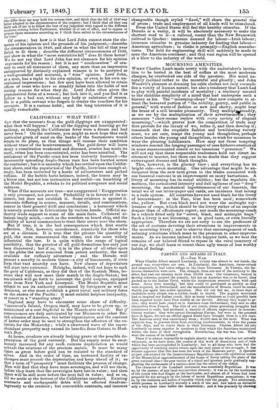MOURNING AMENITIES.
WHEN Charles Lamb made merry with the undertaker's invita- tion to be buried in the best of coffins at the most moderate charges, he overlooked one side of the question. His mind na- turally inclined rather to the mournful and ghastly ; and John Woodvil's pleasure at donning his sable clothes not only exempli- fies a vanity of human nature, but also a tendency that Lamb had to play with painful incidents of mortality ; a tendency natural to the childlike simplicity of a mind that had undergone such a history as his. The "mourning-shops" that now compete to at- tract the bereaved portion of "the nobility, gentry, and public in genera]," with wares of fashion so new and showy, might bear the brunt of a still broader pleasantry. They multiplutteadily, as we see by the multiplication of their advertisemeTts ; they announce "show-rooms replete with every variety of elegant mourning,"—which proves how the competition of trade may first provide for the luxury of wo, refine it, and then develop it; insomuch that the exquisite fashion and bewildering variety must, we are sure, tempt the young and thoughtless, perhaps others besides the young and thoughtless, to wish for occasions to wear the pleasing habiliments. How may not those tempting windows remind the longing passenger of uses hitherto overlooked in some superannuated cousin or too tenacious " governor." We will not say that these respectable tradesmen hold out direct in- citement to murder, but there can be no doubt that they suggest extravagant dreams and black thoughts. This, however, is the gloomy view ; and everything has its bright side—even mourning. One advantage that might be an- ticipated from the new turn• given to the trades connected with our funereal customs is an improvement on many barbarisms. A livery of mourning has its social utilities ; but the repulsive dis- malness, the caricatured intensity and dull ugliness of our " deep" mourning, the mechanical lugubriousness of our funerals, the retail wo of our letter-paper and cards, are incidents that belong to a rude system. All countries have not used black for the livery of bereavement : in the East, blue has been used ; somewhere else, yellow. But even black need not wear the midnight ray- lessness of crape, which should be the livery rather of an impious despair than of affectionate regret ; nor needs the mourning-coach be a vehicle fitted only for " secret, black, and midnight hags." Such a livery is not becoming, or in good taste, or even literally. appropriate. Therefore we are not sorry to see the professors of the art of costume devoting their attentions to improvements in the mourning livery ; nor to observe that encouragement of such solacing attentions which must be the premium to other improve- ments. As we become imbued with happier faith, as we bear the remains of our beloved friend to repose in the rural cemetery of our day, we shall learn to resent these ugly traces of less worthy habits of feeling.






















 Previous page
Previous page